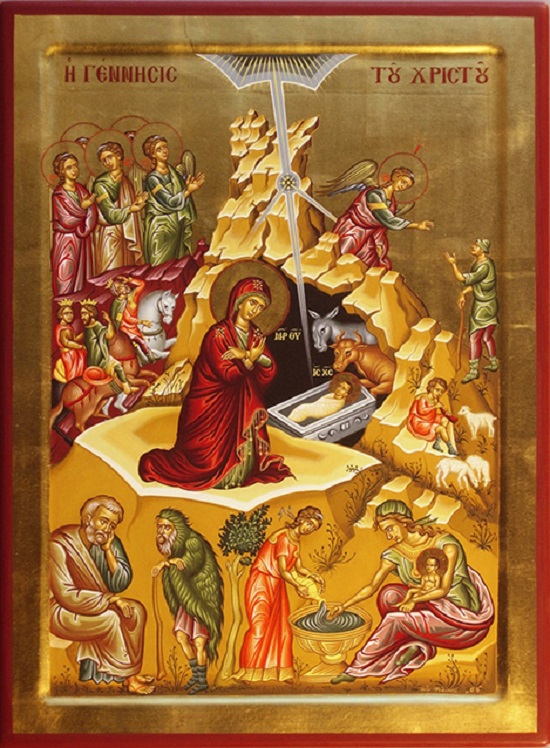The Word Made Flesh
Christmas Day Scripture Readings

The Prologue to John’s Gospel very well might be the single most important passage in all of Scripture, more important than the Exodus from Egypt, and at least as important as the resurrection narratives. This is true because, more than any other text, it touches on the very essence of God. It tells us in very few words who God is and, as a consequence, who we are in relation to God. “In the beginning was the Word.” The beginning is not confined to a point in time. The beginning is the origin point, the vanishing point, the singularity, that from which everything came to be. The beginning takes us to that theoretical point where only God existed. I say “theoretical” because the Prologue identifies that point with the Word.
Here, we find the very nature of God himself exposed. We begin with the Word. In Hebrew, it’s דַבַר (dabar) which means both “word” and the “thing” named by the word. To know the name is to know the thing. When Yahweh God gave Moses access to his Name, God thereby gave Moses and the people of Israel access to his very essence. So, to take the name of Yahweh our God in vain is to abuse the intimate relationship that God provided to his people. The Word—the דַבַר (dabar)—is the thing.
In Greek, the Word is λογος (logos), which, for them, meant the principle of knowability. In other words, everything that is knowable about a thing is its λογος (logos). For example, I cannot truly know you, what you think, or how you feel, the way you yourself do. All that I know about you, and all that I could ever learn about you, is your λογος (logos). Your λογος (logos) is you, but, at the same time, it doesn’t touch on the essence of who you are. All that we know about God, or could ever know about God is his Λογος (Logos). What’s more, God’s very nature is to be Λογος (Logos), to be Word, to express himself, to create, or, in other words, to love. Was there ever, or could there ever have been a point, even at the beginning, where God—the expressive Λογος (Logos)—was not Creating?
The nature of God is to be Word, to be expressive, to communicate. The gospel tells us that ”the Word was with God and the Word was God.” Words convey meaning, they embody knowledge and understanding. God’s Word is unique in that the Word God speaks is himself. Every aspect of our Creator God embodies himself. Spacetime expresses God. The universe expresses God. Our planet expresses God. All life expresses God. Conscious beings express God and, in addition, we’re aware of the God within. “All things came to be through [the Word] and without him nothing came to be. What came to be through [the Word] was life …” Wherever we find beauty, wherever we find life, wherever we find love, we encounter the Word.
In verse 14 of the gospel, this magnificent hymn reaches the apex, the summit, of its expression of God and God’s relationship to humanity. “And the Word became flesh and made his dwelling among us.” God’s essence, the creative power of his love couldn’t be fully grasped, fully encountered from the outside. The incarnation—the Word becoming flesh—had to happen, otherwise, the creation would have remained incomplete. The Word would only partially have been spoken. All the hoopla around Christmas skirts this issue: in Jesus, God’s creation is finally complete. God has said it all. In Jesus, the Word has been spoken, has become one of us, and has “pitched his tent” among us. As the glory of God filled the meeting tent of the Israelites in the desert, and later, filled the temple in Jerusalem, those were but prefigurations of the glory of God that became manifest to us in Jesus. “And we saw his glory, the glory as of the Father’s only Son, full of [enduring love].”
At this time of the year, we celebrate the Word becoming flesh. We celebrate an incarnation of the Word that is not limited to Bethlehem in Judea two thousand years ago. The incarnation began at the beginning of creation. He permeated time and space, the physical universe, life and consciousness. He expressed himself throughout human history until that moment in the shepherds’ cave when God became one of us. Yes, we celebrate that breakthrough, but in no way was that the end of the story. God’s Holy Spirit, God’s life-force and the power behind God’s Word such that it raised up Jesus from the dead was given to us. In that way, the Word now becomes flesh in us.
The Holy Spirit was given not only so that we would know God more intimately than we ever could have through creation alone. Through the Holy Spirit the Word continues to “pitch his tent in us,” in Greek, ἐν ὑμιν (en humin) which can mean either “in our midst” or “within us.” Like all God’s works, the incarnation was never a one-and-done sort of thing. It started in the beginning, it broke through into human history in the life, death, and resurrection of Jesus, but it continues in you and me here even today. The Word continues to become flesh only to the extent that we allow the Holy Spirit, the creative love of God, God’s Λογος (Logos), his Word, to dwell within us. Celebrate Christmas. Rejoice in our commemoration of the birth of Jesus. But remember, all of that is useless unless the Word becomes flesh in Palm Springs, in Chicago, in West Hartford, in Florence, or wherever you are. Mary brought the Word of God to birth in our world centuries ago. Now, it’s our turn. A blessed Christmas to you all.
Get articles from H. Les Brown delivered to your email inbox